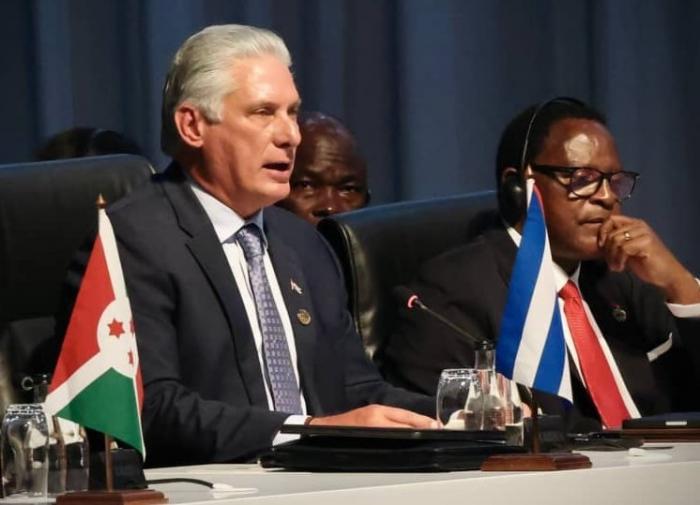Cuban President Miguel Diaz-Canel addresses BRICS Summit in South Africa
Cuban President Miguel Díaz-Canel, in his capacity as rotating president of the G77+China, expressed support for the path to inclusive multilateralism, embodied in the final declaration of the 15th BRICS Summit. Diaz-Canel addressed the Summit on its final day in South Africa.
Johannesburg, August 24 (Prensa Latina)– Cuban President Miguel Díaz-Canel, in his capacity as rotating president of the G77+China, expressed support for the path to inclusive multilateralism, embodied in the final declaration of the 15th BRICS Summit. Diaz-Canel addressed the Summit on its final day in South Africa.
“It is a great honor and a privilege to participate in a summit of the BRICS group” (Brazil, Russia, India, China and South Africa), an integration mechanism that opens hopes for the strengthening of multilateralism, which today is as urgent as it is essential for the very destiny of Humanity.
“I attend this dialogue”, he said, “with the enormous responsibility that it represents for Cuba to chair the Group of 77 and China, the broadest and most diverse grouping of developing nations.” We are 134 countries, he recalled, two thirds of the members of the UN, where almost 80 percent of the planet’s population lives, facing the colossal challenges of an increasingly unequal world, where exclusion and poverty have multiplied after two years of pandemic, followed by dramatic conflicts.
The G77+China and the BRICS, said Díaz-Canel, together have the responsibility and the possibility to act for a change in the current unjust world order.
‘It is not an option; it is the only alternative,” he stressed.
Given the growing authority of the BRICS group on the international scene, he said, the G77+China does not hesitate to welcome its enlargement, which will contribute to strengthen its world relevance and global representativeness.
In his remarks, the Cuban president recalled how the real transformation of the current international financial architecture, which he described as deeply unjust, anachronistic and dysfunctional, is a historical demand of both the G77+China and BRICS.
In this regard, he stressed, the New Development Bank created by BRICS can and should become an alternative to the current financial institutions, which have applied for almost a century, draconian recipes to profit from the reserves of the South and reproduce their schemes of subjugation and domination.
Surely, he said, the extension of this mechanism (of broad-based foreign currency reserves, which can guarantee certainty and stability to the South) to other countries, would contribute to alleviate the imbalances of the current monetary system.
The establishment of mutual lines of credit in local currencies by the banks of the BRICS nations and the possibility of creating a single currency for their operations, he added, are also initiatives that could be applied in relations with other developing countries.
This could reduce the abusive monopoly of the U.S. currency, which reinforces and guarantees a hegemony harmful to the rest of the world, Díaz-Canel stressed.
On climate change, he continued, we emphasize the strategic value of effective coordination between the BRICS and the G77+China, to safeguard the principle of common but differentiated responsibilities in the implementation of the Framework Convention and the Paris Agreement.
On the other hand, scientific-technical development, he recalled, is today monopolized by a club of countries that monopolize most of the patents, technologies, research centers, and promote the drain of talent from our countries.
The G77+China and the Brics should and can, he said, do more to change that situation and in that spirit.
On this issue, he said, Cuba has called for a Summit of Heads of State and Government of the Group of 77 and China on science, technology and innovation as a premise for development, to be held next September in Havana.
“We are expecting to see you there,” he announced to those present, leaders of 65 nations.
“We firmly believe in the power of unity in diversity and that it is time to act together in defense of historic grievances that, because they have not been addressed in time, have multiplied the problems facing our nations today. To move towards a more just and sustainable future, the time for collective action is not tomorrow. It is now.”

